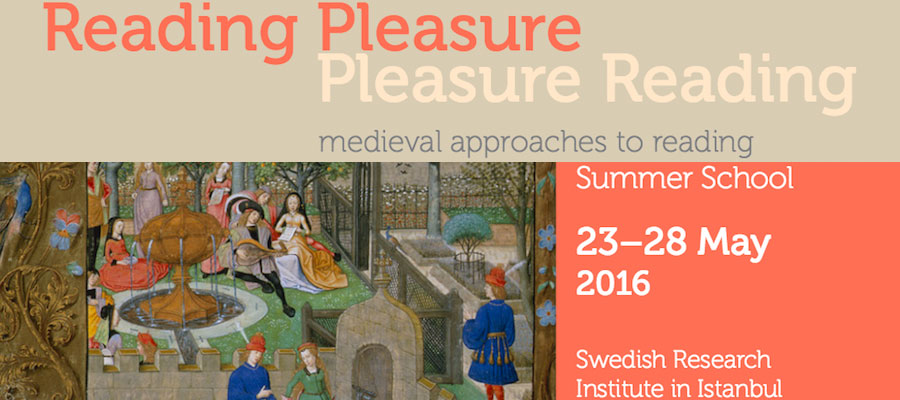Reading Pleasure – Pleasure Reading: Medieval Approaches to Reading, Swedish Research Institute in Istanbul, May 23–28, 2016
This summer school will explore discourses and strategies of reading and pleasure in the Middle Ages. From what appears to have been a primarily pious, learned, and/ or legal use of reading in the early medieval period, books and texts came to be gradually and increasingly associated with notions of pleasure. On the one hand, different kinds of explicit or implicit pleasure made up literary motifs and became a literary theme; on the other, pleasure came to be thought of – at least by some – as fundamental to reading. This tendency concerns not just narrative fiction and poetry, traditionally associated with reading for pleasure, but also genres such as epistolography and historiography. And patterns turn out surprisingly similar in both Persian, Arabic, Byzantine and Western medieval environments.
In theory as in practice, pleasure is easily sought, but equally easily slips out of grasp. The aim of the summer school is to engage with and develop specific approaches that will enable us to discuss medieval developments – of great importance for later premodern and modern literary thinking – across the time gap, but also across the spatial gap between east and west. Aiming for conceptual clarity, we encourage participants to consider the pleasure of storytelling and narrative urges, but also the modern pleasure of reading medieval texts. We wish to open up for a wide range of genres – such as romance, drama, chronography, court poetry, and letters – and numerous perspectives, for instance performance, text/image recognition, book production, genre questions, author-narrator position, or gendered roles in and outside the text.
Some possible themes include Persian, Arabic, Byzantine and Western literature; Middle Ages; reading and storytelling; translations; romance; drama; poetry; letters; chronography; court culture; book history; illuminations; gender studies.
Programme
The summer school will be organized around lectures, discussion groups and time for informal talk. In the mornings, lectures, all of which will be followed by a seminar of the whole group, will address large themes. In the afternoon, smaller seminar groups, each led by a tutor, will work together over the course of the summer school on a series of case studies. These will be combined with smaller excursions by foot. There will be substantial reading in advance. Lunches and two dinners will be in common. On Wednesday there will be a longer excursion.
Tutors are Christian Høgel (University of Southern Denmark), Lars Boje Mortensen (University of Southern Denmark), Ingela Nilsson (Uppsala University), and Elizabeth Tyler (University of York).
Lectures will be delivered by Virginia Langum (Uppsala University), Pernilla Myrne (University of Gothenburg), Stratis Papaioannou (Brown University), and Bo Utas (Uppsala University).
